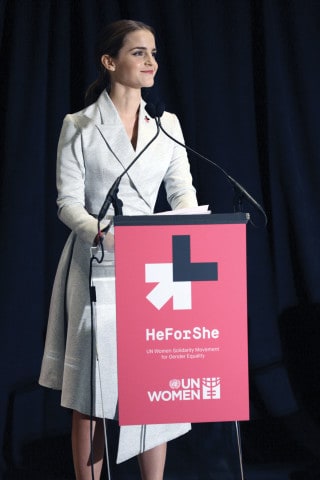2015 was a standout year for feminism. More than ever before, people are calling themselves feminists and taking a stand against patriarchal oppression. This is thanks, in part, to the rise of feminism within popular culture.
Pop culture feminism is the kind of feminism promoted by celebrities such as Taylor Swift, Emma Watson and Beyoncé, largely based around the ideas of girl power, female solidarity and that feminism is for everyone.
While pop culture feminism may be responsible for the popularity of feminism in the last five years, it receives its own fair share of criticism — mostly from more “serious” feminists. To some, the  feminism of Taylor Swift doesn’t dig deep enough. It’s a watered down version of “real” feminism.
feminism of Taylor Swift doesn’t dig deep enough. It’s a watered down version of “real” feminism.
Although pop culture feminism is deserving of critical analysis — as is anything — it’s wrong to dismiss it entirely. Watered down or not, pop culture feminism is important to further the advancement of gender equality — if only for it’s broad appeal to a wide number of demographics.
I’ll preface this argument with a few facts. I am a white, straight-passing, middle class, cisgender woman. I speak from a position of unearned privilege. I’ve never experienced discrimination based on my race, class or sexual orientation. Also, I’m a huge Taylor Swift fan.
While I haven’t been subject to a number of different types of discrimination, I do know what it’s like to be discriminated against because of my gender.
Young women face a world that does not support them. Their experiences and interests — from fashion to crushes to Twilight — are things that we love to make fun of.
How many times have we laughed at jokes about “basic bitches” that love Starbucks and Ugg boots? These are the girls that need feminism just as much — or perhaps more — than anyone.
The thing is, Taylor Swift and Emma Watson are incredibly popular amongst teenage girls — the same girls that are dismissed as silly, superficial and invalid by those who believe they are more serious than these girls.
If millions of teenage girls see that feminism can be, for lack of a better word, cool, then that’s a big step. Whether it’s Swift’s female-empowerment girl squad or Watson’s feminist book club, pop culture feminism lets girls know that feminism is for them and not just the stereotype of hairy, angry, bra-burning radical feminists — not that there’s anything wrong with being one of those either!
You know what other demographic loves Taylor Swift and Emma Watson? Men. Watson received a decent amount of criticism for her well-known “HeforShe” United Nations speech in 2014.
In the speech, she describes how male-identifying people have felt alienated from the feminist movement and how gender inequality hurts men too. She invites men to join the movement for the benefit of everyone.
She was called out for making the feminist movement about the oppressor. But feminism doesn’t exist in a vacuum. Men need to have a place in feminism — they’re roughly half the global population. So maybe Watson softens the hard edges of feminism with her perspective, but she does so in an effort to make feminism for everyone.
We forget that it isn’t the job of celebrities to be “good” feminist activists. They’re entertainers. They’re here to sing, act or market a reality show, not to be feminist scholars. As much as we wish that the next bell hooks or Gloria Steinem would have the notoriety of a pop star, that’s just not how it works.
If a celebrity chooses to advocate for the feminist cause, excellent. But don’t get mad when they don’t do it perfectly or exactly the way that you want them to.
This might be a naïve stance, but I do believe that feminism is about working together. I believe that good feminism includes all feminisms, even those that are dismissed as less academic or serious by some. I believe that men have an important role in the conversation and that the feminist movement can’t afford to alienate half the population.
Most importantly, I believe that feminism is for everyone — even pop stars, men and teenage girls.
—
Photos: Flickr / UN Women
Flickr / Nonu
Leave a Reply